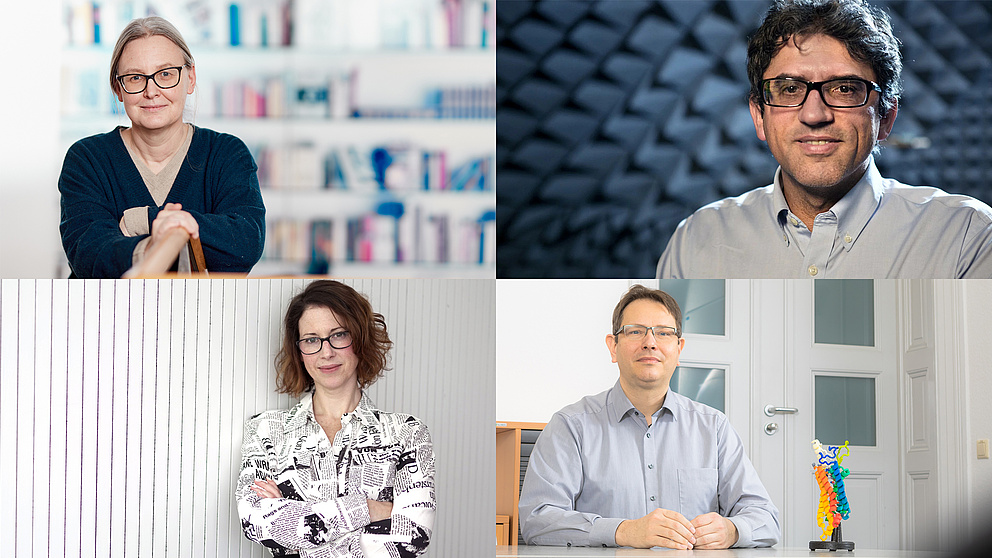

Contact
Press, Communications and Marketing
Tel.: +49 228 833-144
Fax: +49 228 833-441
presse[at]avh.de
Worth €5 million, the Alexander von Humboldt Professorship is the most highly endowed research award in Germany and has now attracted 100 top international researchers from abroad to German universities and research institutions. Four of them illustrate just what the Humboldt Professorships achieve – personally, professionally, but also structurally as a strategic instrument for the universities’ international profiling.
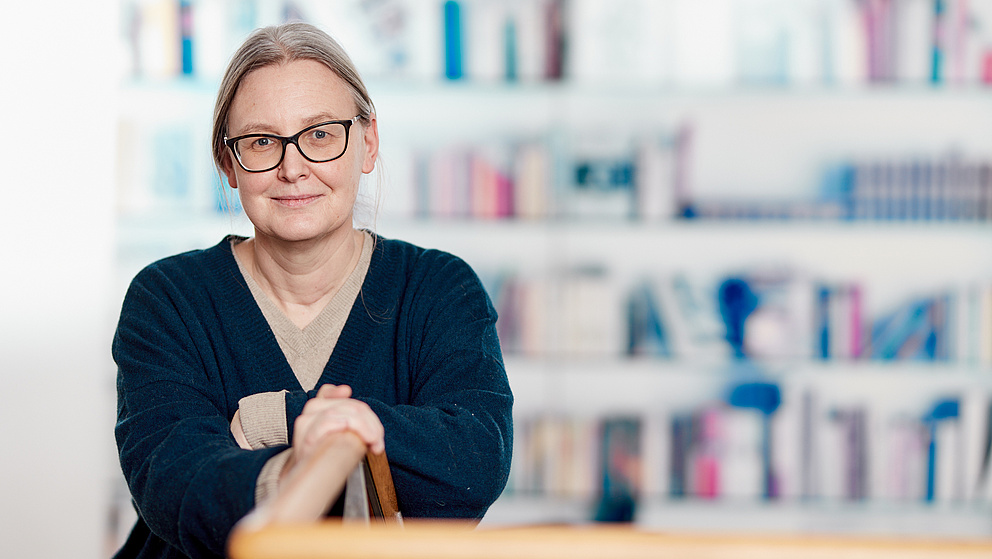
In 2015, Karen Radner transferred from London to LMU Munich where she became Humboldt Professor for the Ancient History of the Near and Middle East. The Austrian researcher works on written and archaeological sources from the countries located between the Nile and the Indus. "The most important thing the Humboldt Professorship has given me is continuity and a long-term perspective. I’ve been able to do things on a bigger scale and with a bigger team. That’s quite a quantum leap," Karen Radner explains. "When you work in such politically difficult areas, it often creates even more problems if you can only plan short-term. It takes ages to get permits in the first place."
"The most important thing the Humboldt Professorship has given me is continuity and a long-term perspective. That’s quite a quantum leap."
Karen Radner is very pleased that she can also give her team good career prospects because in the humanities – unlike in the natural sciences – it is not usual to have a permanent staff. "The great thing is that I was able to offer long-term positions and thus put together a dream team who have security themselves. This would have been completely impossible without the Humboldt Professorship." Karen Radner not only brought members of her international team to Germany, but also, as Humboldt host, for example, the Sofja Kovalevskaja Award winner Enrique Jiménez. He moved from Madrid to Munich and was appointed to a professorship there in record time. And she is also proud that a number of team members who she cannot keep at LMU permanently have been able to benefit from her projects: "What really makes me very, very happy is that many of my team have become professors or acquired long-term projects themselves. A Humboldt Fellow of mine, for example, is now taking up a professorship in Turin."
In disciplinary terms, Radner is also a major gain for her university and the German research landscape: In addition to LMU’s existing focus on Greece and Rome, she has expanded the traditionally strong Ancient History portfolio by including Egypt and Mesopotamia. The students have welcomed the offer, according to Radner, and LMU has been highly supportive: With the establishment of her chair, staff numbers in the department doubled. And with Radner came even more innovations because she also made Munich a stronger base in the Digital Humanities, using digital text corpora in her research and teaching. Her edition projects, such as the Munich Open-access Cuneiform Corpus Initiative, were also a good format for working with junior researchers. "Unlike the UK, I’m fortunate to have student assistants here in Germany. Thanks to the Digital Humanities projects, I can easily involve students in research at an early stage, even from the lower semesters if they are enthusiastic about working with the texts." She raises third-party funding, is involved in the DFG-funded, history-based Collaborative Research Centre “Cultures of Vigilance” as well as in the International Doctorate Programme “Philology” which is funded by the Elite Network of Bavaria.
Karen Radner recalls the beginning of her time as a Humboldt Professor: Without the flexible funding from the Humboldt Professorship, which was available at short notice, she would not have been able to embark on one of her most important research projects, the Peshdar Plain Project in the Autonomous Kurdish Region of Iraq. In 2015, Radner’s site on the Peshdar Plain was acutely threatened by building development, everything had to happen quickly. But as a brand new Humboldt Professor, she was able to organise a salvage excavation quickly and unbureaucratically and hire an excavation manager. She is still enthusiastic today: "It was very, very important and really fantastic; it doesn't usually happen that fast!"
"There’s nowhere else in the world where I can work in a similar way in my field. That's why I'm definitely staying at LMU."
To this day, Karen Radner is convinced: "There’s nowhere else in the world where I can work in a similar way in my field. That's why I'm definitely staying at LMU." When her Humboldt sponsorship came to an end, she was able to continue working at the same level. This year (2022), she will now receive the DFG’s Leibniz Prize and thus the "pleasant challenge of being able to think about what I want to do in the next seven years,” says Karen Radner.
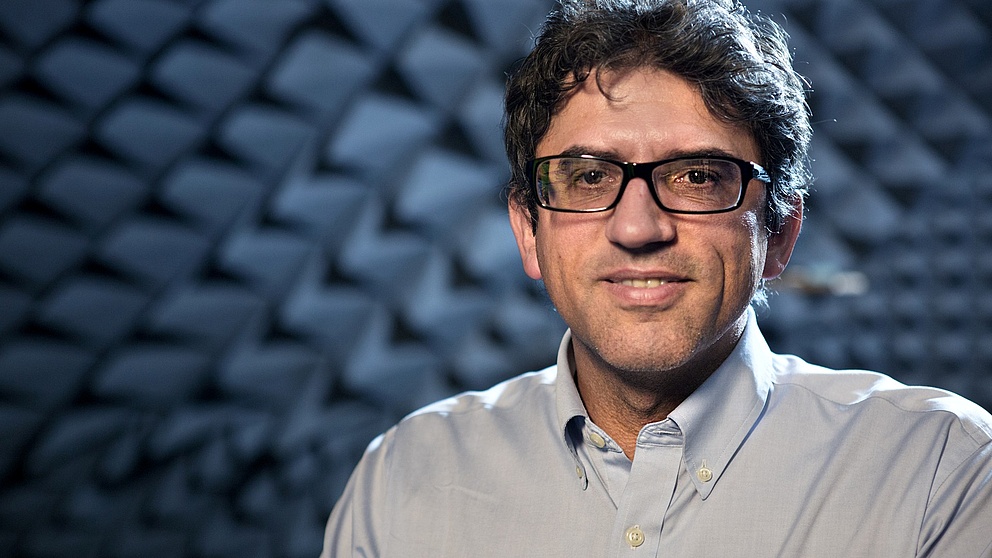
Academic freedom and reliable, good financing are the immediate reasons that spring to Giuseppe Caire's mind for his move to Germany. In 2014, he became a Humboldt Professor at TU Berlin, heading the Communications and Information Theory Group. He had previously worked in the Netherlands, Italy, France, Australia and at the University of Southern California (USC) in Los Angeles. Although there was a very good research infrastructure at USC, the opportunity provided by the Humboldt Professorship to build up a research group from scratch spoke strongly in favour of Berlin: "Fundamentally, the Humboldt Professorship enables you to take risks and break new ground. Things I couldn't do in the US. There you have your spaces and projects, but not the freedom to head off in a new direction." Thanks to the Humboldt Professorship and the resources available at TU Berlin, Caire, the theorist, was able to set up a laboratory that was new territory for him and now combines theory and practice. "With these new skills and aspects of my research, I was able to participate in European and BMBF projects where these competencies were required."
"The Humboldt Professorship enables you to take risks and break new ground. Things I couldn't do in the US."
Giuseppe Caire enjoys working with researchers whose expertise complements his own; he is involved in many collaborative projects in Berlin that create new structures. Examples include the 6G Research and Innovation Cluster (6G-RIC), funded by the Federal Ministry of Education and Research, which aims to develop the key technologies for future 6G communication systems, and the Berlin Institute for the Foundations of Learning and Data (BIFOLD), which develops machine learning for interdisciplinary applications.
The involvement of Caire and other Humboldt Professors in long-term joint research projects, other awards, such as his 2021 Leibniz Prize, as well as start-ups that emerged from his research group illustrate the long-term benefits and synergies for the whole of Germany. And then there are the networking effects associated with Humboldt Professorships: In addition to Caire, Robert Schober (Humboldt Professorship 2012 at FAU Erlangen-Nürnberg) also works in the 6G-RIC cluster. "The conditions in Germany for conducting good research are quite extraordinary. The level of support is very good," says Giuseppe Caire.
Humboldt Professors also benefit the German research system thanks to their external perspective. Giuseppe Caire is a sought-after conversation partner on science policy issues, too. In 2018, during the establishment of the Berlin University Alliance, in which the three Berlin universities FU, HU, TU, and Charité – Universitätsmedizin Berlin joined forces, he was asked for his opinion on how to attract the best minds.
"The Humboldt Professorship has proven to be very positive for our professional development, both for me and for my wife."
Especially at the beginning of the sponsorship period, Guiseppe Caire found the flexibility in the use of funds, when money could also be used for dual career purposes, very valuable. His wife is a medical doctor and had to acquire certain qualifications in Germany before she could register as a specialist. She now works in a hospital in Potsdam. "Our plans are clear. We intend to stay in Berlin. Berlin is a good city to live in – lively, interesting, without being too stressful. I can walk to the office, which wouldn't be possible in LA."
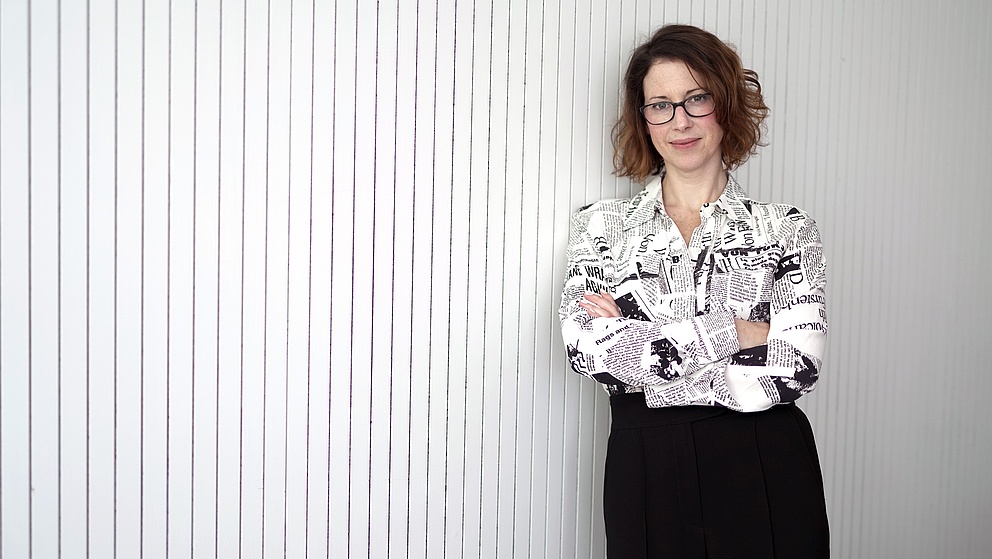
In 2021, one of the first Humboldt Professorships for Artificial Intelligence (AI) brought AI ethicist Aimee van Wynsberghe from TU Delft, the Netherlands, to the University of Bonn. With its Alexander von Humboldt Professorship for AI, the Humboldt Foundation is contributing to the federal government's national AI strategy. Until 2024, the professorship can be awarded to a maximum of 30 additional, outstanding AI researchers who work on AI and its uses as well as its social impact.
For Aimee van Wynsberghe, AI is an ongoing social experiment that requires new rules and control mechanisms. Her research aims to incorporate previously neglected ethical values into the design and development of scientific and technical innovations.
"It was a courageous step to support my unusual, new field of research with a Humboldt Professorship."
The Humboldt Professors’ cutting-edge research repeatedly closes thematic gaps. The University of Bonn created a new professorship in Applied Ethics of Artificial Intelligence for van Wynsberghe so that she could establish her new Sustainable AI LAB there. "My goal is to make Bonn the global hub for sustainable AI research and to show what sustainable artificial intelligence can contribute to the prosperity of society," says Aimee van Wynsberghe. But none of this would have been possible without the Alexander von Humboldt Professorship, she believes: "My research topic is unusual and plays a pioneering role in ethics and AI research. In this respect, it was a courageous step to support it with a Humboldt Professorship."
A Humboldtian who has been cooperating with van Wynsberghe for some time is the philosopher and former Humboldt Foundation Lynen Fellow, Markus Gabriel. He was instrumental in nominating her. At her new base in Bonn, Aimee van Wynsberghe is particularly looking forward to cooperate cooperating with him and others across disciplines in collaborations like the PhenoRob Cluster of Excellence, which works on robotics for sustainable plant production, the Bonn Alliance for Sustainability Research (which aims to strengthen knowledge and skills for sustainable development) and the United Nations Campus. "For me, it was a logical consequence to come to Bonn to explore the topic of sustainable AI. I can become part of this great community that already exists here," says Aimee van Wynsberghe.
"The Humboldt Professorship also gives me the opportunity to work with artists. This doesn’t happen in other funding programmes."
One of her declared goals is to bring together art, science and ethics. In her opinion, the fact that the Humboldt Professorship can also support unusual projects, such as the ArtScience Residency which she announced in 2022, is the unique selling point of the award: "The Humboldt Professorship is an incredible research award because it gives me the opportunity to work with other disciplines and also with artists. This doesn’t happen in other funding programmes."
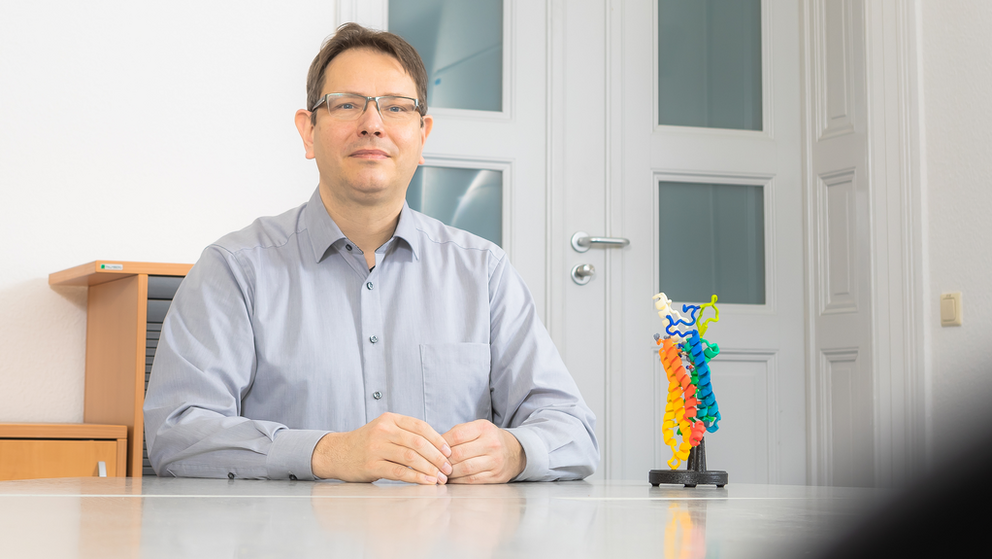
In 2019, the Humboldt Professorship brought Jens Meiler from the United States to Leipzig where the bioinformatics specialist assumed his position in 2020. "It was the Humboldt Professorship that finally made me return to Germany. It was all incredibly professional, very well organised, very flexible. They also talked to me about what I myself wanted. And that's something that stands out." Meiler conducts research for human health with a focus on the development of computer-aided therapeutic design. He programmes algorithms for biomedical research and, for example, writes software that can model proteins.
"It was the Humboldt Professorship that finally made me return to Germany. It was all incredibly professional, very well organised, very flexible."
Jens Meiler intends to stay in Leipzig permanently, also for family reasons, but he still needs his laboratory at Vanderbilt University in Nashville, United States, which he visits regularly. His new institute in Leipzig will continue to grow, especially in terms of space. Not all the labs have yet been renovated, built and equipped, nor are they completely set up for research. Nevertheless, one thing is certain, he says, "The Humboldt Professorship is a huge success! We are building a completely new Institute for Drug Development, and the university has promised me seven professorships or group leader positions, six of which have already been filled."bbbbbbbb Together with a whole team of colleagues, Jens Meiler is currently taking part in a competition run by the Federal Ministry of Education and Research and the Free State of Saxony to create a large-scale research centre in the Central German mining district. His project, the "CMI – Center for Medicine Innovation", aims to drive personalised, digitised medicine. The proposal phase has already been completed, and if the CMI wins the competition this would be a step towards the sustainable development of the former brown-coal mining district, not only for Leipzig, but also for the entire region.
"I have converted from a being a pure researcher to someone who also sustainably changes structures here with my experience from the US."
Thanks to the Humboldt Professorship, Meiler has developed from being a "pure" researcher into a multiplier. He is active in a research group, a Collaborative Research Centre, the Excellence Initiative. He describes his new role: "The Humboldt Professorship not only makes you come to Germany from somewhere else in the world, it also inspires you to convert from being a pure researcher into an initiator who strategically prepares and submits joint projects."
As a Humboldt Professor, Jens Meiler finds it easier to access decision-makers in university management and politics and can thus influence issues like negotiation standards for future Humboldt Professors. He was behind the University of Leipzig’s and the MPI for Mathematics in the Natural Sciences’ successful nomination of Sayan Mukherjee (previously Duke University, USA), who will receive a Humboldt Professorship for Artificial Intelligence in 2022. He also hosts the Sofja Kovalevskaja Award winner Torben Schiffner (most recently at The Scripps Research Institute, USA) and was involved in recruiting Oskar Hallatschek from Berkeley, United States, for a Humboldt Professorship in Leipzig in 2021.
The Humboldt Professors thus resemble crystallisation points around which new, interdisciplinary things emerge in the German research landscape. Many Humboldt Professors from abroad are particularly motivated by the chance to shape structures in Germany; many see it precisely as their mission and their opportunity – this was also one of the findings of the first evaluation of the Alexander von Humboldt Professorship in 2017.
In the context of the Federal Government’s Excellence Initiative in the period 2007-2017, the Federal Ministry of Education and Research and the Humboldt Foundation launched the Alexander von Humboldt Professorship. With an endowment of €5 million, Germany’s most valuable research award was granted to researchers from abroad to relocate to Germany for the first time in 2009; in 2020, the Humboldt Professorship for Artificial Intelligence was also introduced. To date, the award has attracted 100 top international researchers from abroad to German universities.
The Humboldt Professorship enables you to take risks and break new ground. Things I couldn't do in the US.
Science worldwide courts bright minds. Scientific freedom and reliable, good funding are cornerstones of cutting-edge research and therefore also important criteria for deciding on a location. The Humboldt Professorship grants research projects maximum freedom and flexibility and seeks to strengthen the internationalisation and competitiveness of the German research and higher education landscape. It enables universities to create general conditions that can compete internationally.
How it works: Universities in Germany submit nominations for candidates they want to appoint to a professorship to the Alexander von Humboldt Foundation, whose interdisciplinary selection committee decides on the award. A joint nomination with a non-university research institution is also possible. Once a nominee has been selected, appointment negotiations begin with the university. The award is only finally granted when the appointment has been announced. The programme is financed by the Federal Ministry of Education and Research.
